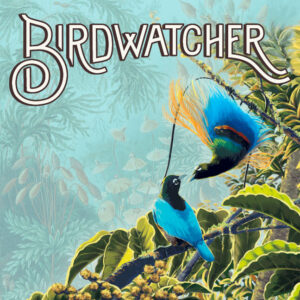 With Wingspan’s success, I anticipated other bird related games, so when Birdwatcher landed on my review table I was neither surprised or honestly that excited. However, this game holds its own. Birdwatcher is a fast-paced, competitive card drafting and set collecting game in which rival photographers attempt to assemble the best Photo Journal comprised of photographs of birds and publications in journals.
With Wingspan’s success, I anticipated other bird related games, so when Birdwatcher landed on my review table I was neither surprised or honestly that excited. However, this game holds its own. Birdwatcher is a fast-paced, competitive card drafting and set collecting game in which rival photographers attempt to assemble the best Photo Journal comprised of photographs of birds and publications in journals.
Gameplay Overview:
The gameplay sticks to the theme and is relatively easy to understand once you start playing. You build your photo journal by taking photographs of birds from your tree or your rivals’ trees and by publishing your findings. Points are earned through set collection of the same birds, unique rare birds with their own point totals, optional exponential scoring birds called “The Twelve-wired Birds of Paradise” (used in a 5-player game and optional for 2-4 players), and end game scoring unique to each publication card.
Cards enter the game/are played in 4 locations:
- The Academy: Starts with 3 face-up Publication cards start that are immediately replaced when taken.
- The Jungle: Starts with 3 face-up Bird cards from the bird deck and are replaced when birds are called to a player’s tree or when the “run into jungle action” is taken.
- The Clearing: This location starts with no birds, but there are four spaces that fill when birds are startled by photographs being taken or by birds cleared from the jungle following a “run into the jungle” action.
- Player’s Tree: Each player starts with 4 face-up birds in their tree (maximum of 6 birds are allowed in the tree)
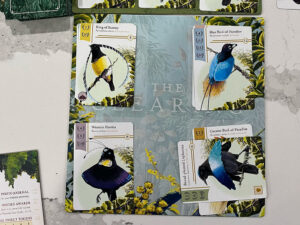
Each player has three actions to use on their turn:
- Take a photo of a bird in your own tree: This action puts one bird in your photo journal but also startles your own bird to the clearing. (So, it can only be performed when you have at least two birds in your tree)
- Perform a bird call: This action adds all visible birds from the clearing and jungle to your tree up to a maximum of 6 birds.
- Run into the jungle: Move the 3 birds from the jungle to 3 separate spaces in the clearing and refill the three spaces in the jungle.
- Zoom Lens (requires 2 actions): Takes a bird from an opponent’s tree and places it into your photo journal, you must also place a bird from your tree and one from the bird deck in their tree. (Can only be performed when you have at least one bird in your tree)
- Publish (Requires 2 actions): Place a publication card from the Academy into your photo journal.
The game ends when the first player reaches a set number of pages in their photo journal.
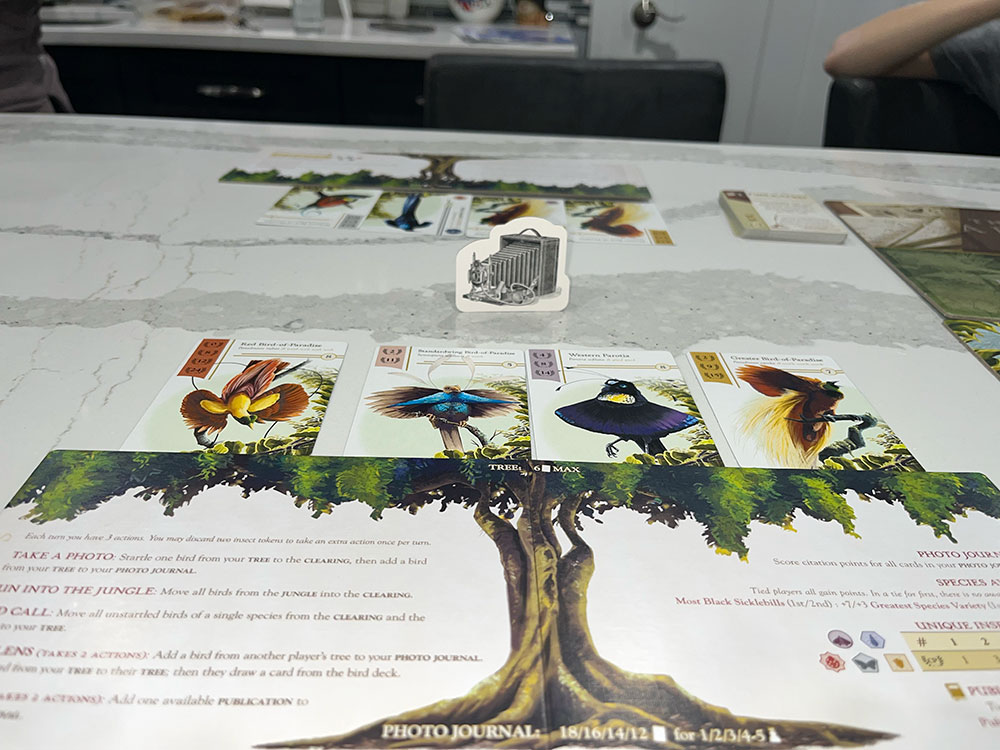
Game Experience:
Much like the hobby itself, the Gameplay Overview I just wrote is a little dull, but the game itself is not. It plays very quickly as you call the birds you want to take photos of to your tree, take photos, startle birds, and score points. The publications can help focus your strategy as they reward you for complete sets, incomplete sets, birds with insect tokens, etc… This all results in a variety of successful strategies that you can use to win the game.
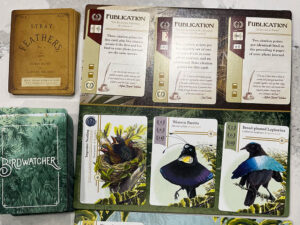
You can try and collect the set of birds that are worth the most, you can go for rare birds, you can adjust your strategy based on the publications available, or you can try and collect the Twelve-wired Birds of Paradise to score exponentially. (Although honestly, the math on this last strategy is questionable as you don’t know how many of these birds will appear and with only 12 pages that you can fill in your photo journal it’s hard to score a significantly higher score with this strategy, but I guess if the cards fall perfectly and no one steals your bird it could be very valuable)
Speaking of stealing birds (Zoom Lens action), this is an interesting strategy. It appears to cost more as it requires two actions, but so does calling birds to your tree and then taking photos of them. Zoom Lens allows you to prevent opponents from scoring while scoring yourself, but at the cost of giving your opponent two birds one from your tree and one randomly from the deck without needing to call the birds to their tree. So, you definitely need to evaluate the risk-reward on this action. My son Damian loves performing Zoom Lens but hates when people do it to him.
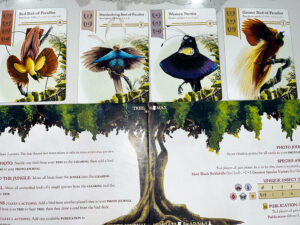
In practice, I have had to switch strategies mid-game nearly every time based on the birds available and new publications that appear in the Academy. There are three other scoring options not previously discussed, insects appear on some of the bird cards, not sure why, but they score for each unique insect as follows: 1-1, 2-3, 3-6, 4-10, 5-15, or you can turn two insects in for an extra action. At the end of the game, whoever has the most book icons on publications gets 5 points and the person with the least loses 2 points. The final way to score is the photographer with the greatest variety of birds gets 7 points with second place getting 3 points. All these scoring options can alter your strategy too.
Solo Mode:
I have mentioned before, but I don’t love solo board game playing. This game has a solo mode that is set-up is the same as with 2 players. You are playing against “The Crew”, a rival group of photographers (there are 6 difficulty levels). The player’s turn remains the same as above, but The Crew’s actions are based on how many birds are in their tree and what type of birds are in the jungle and the clearing. The game ends when the player or The Crew places their 18th page in their photo journals. If you win there is a list of Achievements that you can record on the back of the rule book. If you like solo mode, you should enjoy this version.
Final Thoughts:
Once you understand the rules, Birdwatcher can fly, (Yep, pun intended). I love being able to complete a game full of strategy in under thirty minutes. This game hit on most levels for me. The variety of ways to score without being point salad is excellent and offers replay value by attempting different strategies in each game. I played with my family and my wife and both my 8 and 10-year-old requested to play again immediately after playing the first time because they wanted to try a different strategy. I have not yet mentioned the beautiful artwork. The birds are gorgeous, the play areas are interesting, and the trees are well-designed with all the rules on them including scoring, which I appreciate as it limits the number of times I needed to pull the rulebook out to clarify rules. The components are all excellent and enhance the gameplay.
Final Score: 4 Stars – Birdwatching may not be the most exciting theme, but this game is not for the birds. It’s a fast-paced game that, once the rules are mastered, can be finished in under 30 minutes with requests to play again immediately. That I think is the highest compliment for a game.
 Hits:
Hits:
• The fast pace of the game
• Equally fun at all player counts without increasing play.
• The art is beautiful and the components are both functional and well made.
• High replay value
• With multiples way to score, different strategies can work to win.
Misses:
• The theme may be a hard sell for some casual gamers.
• The Twelve-wired Birds of Paradise scoring makes them a potentially high-scoring strategy, but the reality is that not enough of them will appear to be worth it in most games.
• The multiple ways to score can result in players forgetting one of the scoring options





















